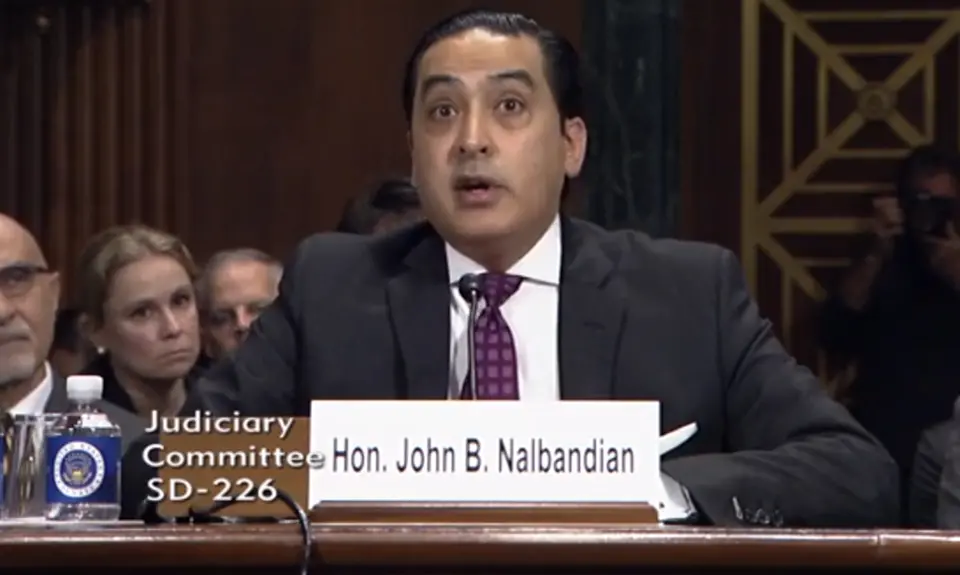“Confirmed Judges, Confirmed Fears” is a blog series documenting the harmful impact of President Trump’s judges on Americans’ rights and liberties. Cases in the series can be found by issue and by judge at this link.
Trump Sixth Circuit Judge John Nalbandian argued in dissent that a Black police officer should not have the opportunity to prove at trial that he was improperly retaliated against and that a lower court grant of summary judgment against him should be affirmed. The majority rejected Nalbandian’s claim and sent the case back to the district court so that the officer could seek to prove his case at trial in its April 2021 decisions in Strickland v City of Detroit.
Johnny Strickland, who is African-American, has worked on the Detroit police force since 2008, and was promoted to sergeant after serving on the force for about ten years. He has contended that he has been subject to racial harassment “throughout his tenure as a police officer,” and filed a federal civil rights complaint stemming from a January, 2017 incident and the department’s reaction to it.
Specifically, shortly after his shift ended on January 22, 2017, Strickland pulled into a gas station near his home. “Unbeknownst to him,” police were investigating a reported incendiary device there, but due to a thick fog, Strickland could not see the police and fire vehicles there as he pulled into the station.
Strickland still could not see as he first got out of his car, but when he saw uniformed police officer Rodney Ballinger “emerge from the fog,” Strickland immediately identified himself as an officer as well. Ballinger screamed and yelled at Strickland anyway, put handcuffs on him that were “extremely tight,” took him over to some other officers and called him “stupid and dumb,” and the handcuffs were tightened further, leading to a later diagnosis of a “bilateral wrist contusion.”
Strickland complained that Ballinger and several other officers had mistreated him based on race and other factors, even though a higher officer told him “there would be consequences” if he complained. In fact, it was Strickland who was “disciplined” and “suspended for three days without pay or benefits” as a result of the incident. Strickland was charged with “neglect of duty” for failing to document in his activity log that he obtained access to and watched a gas station video of the incident.
Strickland filed a civil rights suit in federal court against the City and police officials, claiming that he had been subject to a racially hostile work environment, excessive force during the handcuffing incident, and improper retaliation for complaining against police officials. After discovery, the lower court granted summary judgment on all claims without a trial against Strickland, and Strickland appealed.
All three judges on a Sixth Circuit panel agreed that the decision on the hostile work environment claim was proper in light of the “limited number of incidents” of racial harassment reported by Strickland, as Judge Eric Clay put it, and all three agreed that the lower court was wrong to grant qualified immunity and summary judgment to the police concerning the excessive force claims. Two judges, Judge Clay and Judge Julia Smith Gibbons, who was nominated by President George W Bush, also ruled that the lower court was wrong to grant summary judgment against Strickland on his retaliation claim under federal civil rights law, pointing out that there was a “genuine dispute of material fact” as to whether the claim that Strickland was disciplined for violating police procedures was a “pretext,” because Strickland introduced evidence that a white officer, Steven Murdock, had similarly not completed an activity log but was not disciplined or even investigated.
Trump judge Nalbandian dissented, claiming that Strickland and Murdock were not “similarly situated” because they had “different positions” and “conduct.” The majority pointed out, however, that the city had presented “no evidence or claim” that these differences were “in fact relevant to the Department’s disciplinary decisions.” Nalbandian believed that Murdock’s testimony was more credible on the issue of whether officers were required to complete activity reports, but the majority explained that in considering a motion for summary judgment, the courts have ruled that “we cannot weigh which of these stories is more credible” and that as long as a “reasonable juror” could credit a plaintiff like Strickland, “the case must proceed to a trial.”
If it had been up to Trump judge Nalbandian, Johnny Strickland’s claim of improper retaliation would have been dismissed, and it would be easier for employers to defeat such claims without a trial. Instead, Strickland will have the opportunity to try to prove to a jury that he was improperly retaliated against in violation of federal civil rights laws.
